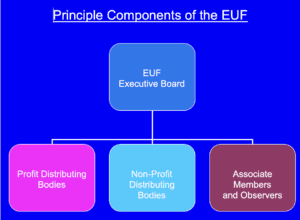About the EUF
Structure
 The EUF is registered in the United Kingdom as a company limited by guarantee – a non-profit organisation. Member organisations are represented by council delegates who decide policy matters and elect executive officers to carry out these policies, each full member organisation carrying one vote.
The EUF is registered in the United Kingdom as a company limited by guarantee – a non-profit organisation. Member organisations are represented by council delegates who decide policy matters and elect executive officers to carry out these policies, each full member organisation carrying one vote.
Day-to-day operation is in the hands of the EUF Executive Board, consisting of six elected directors including the President, Treasurer and Secretary General. The Board serving a three-year term.
CMAS Europe and RSTC Europe each put forward one director with the elective council approving them and choosing another four.
- 3,000,000 divers;
- 5,000 clubs;
- 60,000 diving instructors;
- 2,500 diving schools.
Recreational diving activities account for an estimated direct turnover of some 1,400 Million Euro per annum, plus an indirect travel and tourism market value of around 520 Million Euro.
Areas of competence
The adventurous nature of our sport and its associated evolving technologies means it is constantly developing and techniques are under continuous review, with agreed changes made as and when they are appropriate.
With the enormous breadth and depth of its member organisations’ expertise as its background, the European Underwater Federation claims unique competency in all aspects of sport diving and recreational diver training and would wish to be consulted and involved in all matters pertaining to our sport.
- Regulation of the conduct of recreational diving, in swimming pools, inland waters, rivers and the sea;
- Regulation of the conduct of related competitive activities, in swimming pools, inland waters, rivers and the sea;
- Regulation of access by recreational divers to swimming pools, inland waters, rivers and the sea;
- Regulation of the training of recreational divers, in swimming pools, inland waters, rivers and the sea;
- Regulation of the specification, transport, use, maintenance and inspection of diving equipment, including high-pressure breathing gas compression, mixing, transport and storage systems (compressors and cylinders);
- Regulation affecting the treatment of injuries associated with such activities;
- Regulation affecting the teaching of recreational diving;
- Regulation covering professionals using sport diving techniques, such as archaeologists, scientists, journalists, photographers, recreational diving instructors, etc.
The EUF does not claim competency in fields outside recreational, cultural and sporting activities, where specialist skills and equipment are used such as in construction, production, testing or demolition work, or in military operations.
Areas of interest
Besides our interest in matters directly related to recreational diving, pursuance of our sport often involves other activities.
An example of this is the dependence of recreational divers on surface craft as a means of transport to and from dive sites.
- Small boats owned and operated by individual divers, instructors or schools;
- Small boats owned and operated by groups of divers (Clubs);
- Day boats hired by divers, instructors or schools;
- Live on board vessels chartered by divers, instructors or schools;
- Vessels operated by dive schools;
- Recompression facilities used for training or therapeutic treatment of divers.
The EUF would wish to be consulted and involved in the drafting of regulation or legislation covering the operation of such craft, including licensing and inspection of the craft and ancillary equipment, and competence of the operator, especially in areas specific to diving operations.



